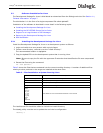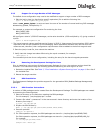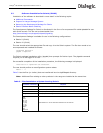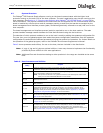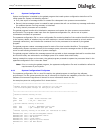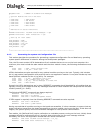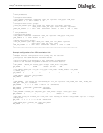
27
Dialogic
®
DSI SS7MD Programmer’s Manual Issue 3
4.2 System Structure
The Dialogic
®
DSI Protocol Stack software running on the board communicates with the higher level
protocols running on the main CPU of the host computer. The user’s application may also be running on the
host computer. See Section 4.3, “Running Host Binaries With Dialogic
®
DSI SS7MD Board” on page 28 for
more information. The physical interface to the board uses the PCI Express bus. All communication with the
board is handled by a device driver and all messages passing to and from the board are managed by the
board management and interface process (ssdm, sometimes generically referred to as ssd) that runs on the
host computer.
The board management and interface process (ssdm) is required to run on the host machine. The ssdm
process handles message transfer between the host and the board using the device driver.
The selection of which protocol modules to run on the host is made by editing the system.txt configuration file.
The user then runs the gctload program that reads the system configuration parameters from the system.txt
configuration file and starts the selected processes bringing the system into operation. For further details on
the operation of the gctload program, refer to the Software Environment Programmer’s Manual.
Table 5 shows processes and utilities, for use on the host, that are included in the distribution.
Note: s7_mgt, s7_log and s7_play are optional utilities. A user may choose to implement the functionality
provided by these utilities in their own applications.
Note: Additional files and directories relating to other products in the range are installed at the same
time.
Table 5. Host Processes and Utilities
Process or
Utility
Purpose
gctload
Process to initialize the system environment and start the other related processes running
on the host, deriving the configuration from a text file (system.txt).
ssdm
Process to interface with the device driver for passing messages to and from the board(s)
and for downloading software to the board(s).
NOTE: This process is referred to in a generic manner as 'ssd' although the name of the
binary for use with DSI SS7MD Boards is in fact 'ssdm'.
tick_lnx
tick_sol
Protocol timer process to send periodic tick notification to the tim_xxx process that in turn
handles protocol timers.
tim_lnx
tim_sol
Process to receive periodic tick notification from tick_xxx and handle protocol timers for all
other processes.
s7_mgt
Process to perform one time protocol configuration for the protocol modules, deriving the
configuration parameters from a text file (config.txt). This process is optional. As an
alternative to using it, the user may elect to perform protocol configuration by sending
messages directly to the other modules in the system. Refer to Appendix A, “Protocol
Configuration Using Discrete Messages” for more information.
s7_log
Utility process to allow messages received from the protocol stack to be logged to a text file.
This is useful for diagnostic purposes when getting started. Refer to Section 8.1, “s7_log” on
page 162 for more information.
s7_play
Utility process used to generate messages from a text file and send them into the system.
This is useful for diagnostic purposes when getting started. Refer to Section 8.2, “s7_play”
on page 165 for more information.
tempmon
Utility process that runs in isolation from the GCT environment and periodically reads back
the temperature, as recorded by the on-board temperature sensor, of all SS7MD boards
present in the system and logs these together with the date, time, and board serial
numbers. This permits the user to evaluate the suitability of a host chassis for deployment.
Refer to Section 8.8, “tempmon” on page 175 for more information.



